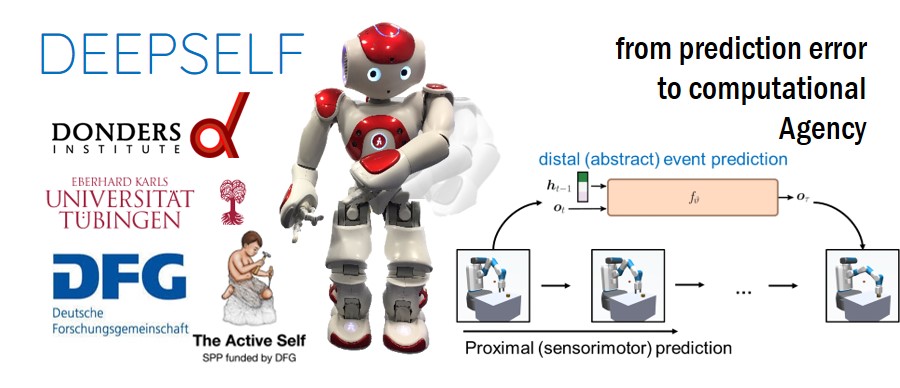Postdoc on brain-inspired deep learning for robots
The Donders Institute is looking for an early career postdoc on brain-inspired deep learning for robots for the international project DEEPSELF (3 years), funded by the German Research Foundation (DFG), between the Donders Institute (Netherlands, supervision: Pablo Lanillos) and Tübingen University (Germany, supervision: Martin Butz). DEEPSELF is a project that lies between machine learning and cognitive science to investigate the emergence of agency in artificial entities by learning hierarchical predictive encodings of events.

Interested contact p.lanillos[at]donders[dot]ru[dot]nl
Description
Agency appears to enable us to learn, discern and anticipate the consequences of our actions. What should be the internal representation that the agent should learn to plan in different temporal scales? how we can enable robots to answer ‘Did I do it?’ and use that information to interact with the world?
The postdoc will be in charge of developing new brain-inspired machine learning models to allow a robot to learn hierarchical event codes from sensorimotor experience and plan future actions using these event codes. This abilities will be tested in robotic experiments to investigate the emergence of Agency on three levels of abstraction based on human science findings.
The selected candidate will work in an international project team in close collaboration with two PhD students and the principal investigators. The candidate will join an exciting and vibrant young team of experts in machine learning, artificial intelligence and robotics, as well as, be part of a big community of ~20 interdisciplinary research projects under the Active Self DFG priority program umbrella. Thus, the candidate will have the opportunity to take leadership responsibilities and considerably increase the research network. Furthermore, the candidate will participate in summer schools and events organized by the priority program.
Keywords: Hierarchical Deep Learning, Event Segmentation Theory, Active Inference, Robot learning, Agency.
We strongly encourage submissions from different representative minorities.
Profile
Essential
- A PhD in Artificial Intelligence, Machine Learning, Computational Neuroscience or Robotics
- Experience in probabilistic deep learning
- Good mathematical skills
Desirable
- Knowledge in any of the following topics: active inference, predictive coding, state representation learning, reinforcement learning, control as inference
- Previous work with robots
- Cognitive science experience
Work environment
The successful candidate will join the Donders Institute for Brain, Cognition and Behaviour and the department of artificial intelligence at Radboud University in the Netherlands. You will have the opportunity to collaborate and interact with renowned experts in multiple fields and benefit from an exciting growing environment around the European Lab for Learning and Intelligent Systems (ELLIS) Nijmegen unit.
The Donders Institute for Brain, Cognition and Behaviour is a world-class interfaculty research centre, that houses more than 700 researchers devoted to understanding the mechanistic underpinnings of the human mind. Research at the Donders Institute is focused on four themes: Language and communication, Perception, action and control, Plasticity and memory, and Neural computation and Neurotechnology. The Donders Institute has been assessed by an international evaluation committee as excellent and recognized as a ‘very stimulating environment for top researchers, as well as for young talent’. The Donders Institute fosters a collaborative, multi-disciplinary, supportive research environment with a diverse international staff. English is the lingua franca at the Institute.
The Department of Artificial Intelligence focuses on the development of human-like AI systems and new intelligent technology. Our group investigates computational principles that underlie natural intelligence and uses these principles to develop more capable and efficient intelligent machines. The department is responsible for the successful educational program in cognitive AI, which currently hosts about 600 AI students, and aims to develop the next generation of responsible AI systems. The department also operates the RobotLab which hosts several robots, e.g., humanoids, industrial arms and significant computational resources at its disposal for developing deep learning models and simulating neural networks, including GPU clusters.
References
Lanillos, P., Meo, C., Pezzato, C., Meera, A. A., Baioumy, M., Ohata, W., … & Tani, J. (2021). Active Inference in Robotics and Artificial Agents: Survey and Challenges. Under review IEEE T-RO [Paper]
Gumbsch, C., Butz, M. V., & Martius, G. (2021). Sparsely Changing Latent States for Prediction and Planning in Partially Observable Domains. Advances in Neural Information Processing Systems, 34. [Paper]